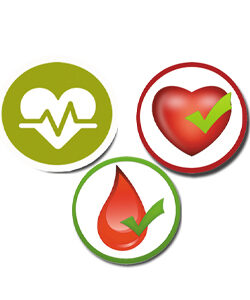Description
The Heart Disease A&M Package provides:
- Complete physical examination,
- Urinalysis,
- CBC, Chem Pac, Lipid panel.
- ECG,
- Cardiac Stress Testing,
- Echocardiogram,
- Chest X ray,
- 4 additional Doctor’s visits.
- 12 monthly supplies of cardiac medications from the Medesure formulary. (Price not included in Package price)
The Package provides a comprehensive evaluation of the heart, in addition to a comprehensive physical examination, urine evaluation, comprehensive laboratory tests and chest X ray.
The urine evaluation provides information about the function of the kidneys, which are often secondarily affected by diseases of the heart and blood vessels (cardiovascular system).
The comprehensive laboratory tests – CBC, Chem Pac, lipid panel – seek to identify abnormalities of the blood cells, blood chemistry, blood glucose, lipid (cholesterol) panel, kidney function and liver function. Additional tests, not covered by this package, may be recommended by the Medesure Physician to further evaluate abnormalities.
An electrocardiogram or ECG test records the electric current that causes the heart to beat as it passes through the heart. When there is a blockage of any of the very small branches of blood vessels carrying blood to the heart, there is some damage to the heart that often does not cause any symptoms, and are not noticed during regular activities. The electric current does not flow normally through the damaged portions of the heart, and even small damaged patches can be picked up on the ECG test.
If there is poor blood flow to the heart muscle, this could lead to a heart attack. The ECG may be normal when at rest, but changes may show up during exercise, which is called a Stress Test, before a heart attack actually occurs. This can then be treated and prevented.
An echocardiogram, which is an ultrasound of the heart, will determine the size of the heart, the thickness of the walls and how well they function, and identify abnormalities of the heart structures and how they function.
A chest X ray provides information about many conditions that may involve the lung, but also provides important information about the heart and its effect on the lungs and vice versa.
Follow up office visits are brief visits for a status assessment of cardiac function, to review and discussion of laboratory data, assess compliance with medications, evaluation of medication side effects or adverse reactions, and medication dosage adjustments, additions or discontinuation.



